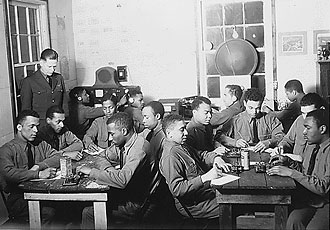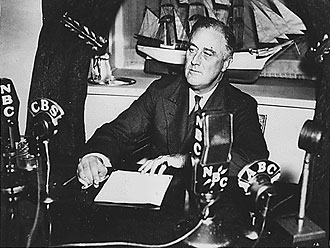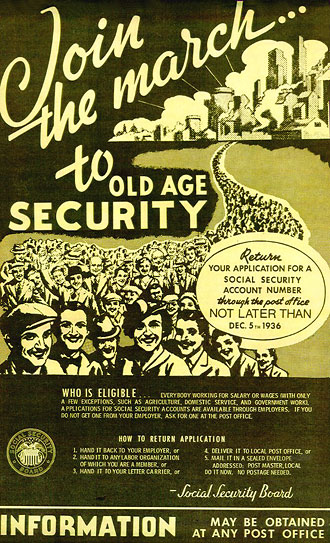




Advanced Search
Dress Up | 1st Person | African American Map | Now Read This | Magic Lens | Tool Videos | Architecture | e-Postcards | Chronologies
|
First Person > Dr. Ruth B. Loving Dr. Ruth B. Loving - 1929-1940: Ruth remembers the Great Depression, her young adult yearsWhen her mother asked Ruth what she would like to do as a profession, Ruth replied that she wanted to become a singer. Although as an adult Ruth would appear on stage many times, sometimes alone, sometimes with her children, she remembers that, as an 18– year– old young woman, she danced at Harlem's Cotton Club once, and only once... Learn more about Dr. Ruth B. Loving: View a timeline of her life and listen to her full interview. Stories by this speaker

A group of CCC enrollees sending and receiving Morse Code transmissions. The Civilian Conservation Corps was one of the New Deal programs developed by the Roosevelt administration during the Great Depression. It was designed to give young men an opportunity earn money, most of which would be sent home to their families, while they also helped with the conservation of the nation's natural resources. By 1935, CCC camps throughout the nation were segregated as the result of local pressures and internal administrative decisions. However, black enrollees received similar compensation and benefits to those received by white enrollees. They received a monthly stipend and "three well prepared and ample meals a day" (in 1941 the CCC reported that the "gain in weight" of their 'colored youth' "has ranged from seven to fifteen pounds for each boy.") Additionally, these young men could participate in jobs and courses that, nationwide, totaled 11,500 courses covering 150 topics. This training ranged from reading, accounting, and office management to plumbing, engineering, and construction.1 "Civilian Conservation Corps, Kane, Pennsylvania, Co. 2314-C: radio code practice, collection of the Franklin D. Roosevelt Presidential Library and Museum, 48223897(65), Public Domain. 1Civilian Conservation Corps. The CCC and Colored Youth. Washington, D.C.: United States Government Printing Offices, 1941. [Edgar Brown] WHAT THE CIVILIAN CONSERVATION CORPS (CCC) IS DOING FOR COLORED YOUTH 
Ruth and her parents were aware of President Roosevelt's physical disability. As Ruth remembers, "Franklin Delano Roosevelt, even though he couldn't walk too well 'cause of his paralysis, he was, in my mind, was a great gentleman because he seemed to be doing things to help the little man." Between 1933 and 1944, President Roosevelt spoke to the American people through a series of evening radio speeches known as the Fireside Chats. As they did for many Americans, President Roosevelt’s radio addresses appealed to Ruth’s mom and dad. Ruth recalls, “President Franklin Delano Roosevelt's magic smile, fireside chat that Ma and Dad used to sit down and listen to, and I, I would listen along with them, too. And I could look at their faces. They were pleased with what he was saying.” Franklin D. Roosevelt delivering a fireside chat in Washington, D.C., April 28, 1935, collection of the Franklin D. Roosevelt Presidential Library and Museum, 4849311, Public Domain. 
"Join the march…to old age security" is one of a number of posters created by the Social Security Board to educate the American public about applying for the new Social Security Account. Among the New Deal programs which Ruth and her parents believed made a lot of sense was the institution of Social Security benefits. When the Social Security Act became law on August 14, 1935, President Roosevelt observed, We can never insure one hundred percent of the population against one hundred percent of the hazards and vicissitudes of life, but we have tried to frame a law which will give some measure of protection to the average citizen and to his family against the loss of a job and against poverty-ridden old age. United States Government, "Join the March to Old Age Security," 1936, public domain. Story Clip #1:Ruth learns French at Hillhouse High School Wait for each file to download, then click the arrow to play the audio. Well, the things about my high school years were great, for the simple reason I remember signing up to go to Hillhouse High School...then, you had to take a foreign language, and I chose...selected French for the simple reason, I liked French songs, little ditties, and Eartha Kitt was very popular in those days, and I... took French for four years, and J'di parle en francais un petite aussi, today, and um, I'm just wondering why it is youth don't do that today in these schools around here in Massachusetts, have them take a language, but that's another thing. I enjoyed my school life. Story Clip #2:Ruth dances at the Cotton Club ONE TIME Then my mother wanted to know, what did I want to do when I got out of high school, and I said to her, I'd like to be a singer. First, because I was playing the piano, and my mother could get that fifty cents together where I was going to a teacher for fifty cents in those days. ...I was being taught organ, uh, there...at twelve, thirteen years old, from our um...minister of music, Professor [John] Cadette. Only thing I couldn't reach the base pedals on the floor, but he taught me how to play the double console organ, pipe organ there in New Haven, and I learned how to play the organ without using the base notes and how to turn it on...so I had a very musical life, and in time, that my sister, older sister married and went to New York to live, and we began to hear about the two Jewish brothers who opened a nightclub. It was pretty important to people who were coming from overseas I said maybe, ... before I went to New York, that I might be able to get a job singing with Lillian someplace in one of those nightclubs or something, and Ma agreed..."she should go and try." Uh...but they were auditioning the time that I went there ...like in the...oh, June, July area, for dancers ...to be in the chorus line for their fall presentation of Cotton Club. It was becoming kinda well known and I said, well rather than singin maybe I, I could do a little tap dancing, a little soft shoe that I used to do with my brothers, so I...so anyhow, I auditioned. And uh, during the July and August months, we practiced and did our, our shuffling and tap dancing and soft shoe and had it down, and it opened in September, in the fall of the year for the regular season, the holiday season. And the night, the night they gave us our, our...costume to wear...there was older women who used to take care of me 'cause I was young then... Q: How old were you? Eighteen...eighteen, and um... and I looked at ...[the costume] and I held it up and said, wh..where's the other part? Where's the skirt? And she...they just said to me, put it on! I said, yeah, but where's the rest of it, 'cause it was just like a little strip...I learned that was a bra then. And um...there were these little, little panties, and I said, ... uh, I uh, I wanted a skirt, and no...anyhow, I put it on...put it on, and then there were six little...we were given six little...six uh...peacock feathers, with the long...part of their stems to it, that went in the back, the rear of our little pants we had on, so that uh, so that...I'm not even gonna look at your face... so that when we did our shaking and our steps, those feathers would left... and right... when you went left and right. And alls I could think of was, oooh, my goodness, I had nothing down in...in between my little strip across my bra and, and my panties. I said, kept saying to myself, oooohhh, my mother. I hope she not...don't come to the club, 'cause I g...we, uh, we didn't dress like that in those years there in twenties. Anyhow, my sister was allowed to be a guest...to sit along side there near the front row, and I remember when I was shaking, you know, I looked over at her, and all her mouth was wide open and so was her husband's, and I just kept dancing, kept dancing...so when it was over, Lillian came...my older sister came over, walked up, she just....you can't stay here! I'm gonna have to tell Ma what you're doing. I said, yeah, but look at the money I'm getting! Nah! Couldn't...anyhow, she called Ma, and told Ma...Ma told me come home. I didn't even spend the rest of the week. No, Ma wanted me right home before the end of the week. I was not to be in any kind of entertainment like that. Q: So you had one performance? No, I had to tell them I had to go. I couldn't stay! But they had substitute girls to go in...but that was...uh...I think I was very happy to have taken off, because I wasn't geared to undress to entertain. A singer, you know, keeps a well dressed...nice gown. So that was my first experience in entertainment and watching what I was getting into. Ma made me come home. She said, no, no, no...I had to go...but over the years I began to um...be a part of activities. Story Clip #3:Ruth's brothers Alexander and Louis join the Civilian Conservation Corps There was the, the days of the Depression when, ...everything when I say was rationed, it was rationed. And I remember my ...brothers, ...two oldest brothers, Alexander and Louis. They were out of high school, too, of course; they were older than I was, and they were trying to get jobs. And the only job they could get at the time...Franklin Delano Roosevelt wanted the youth to come and clean up the areas, work in the green areas, so they joined up the Conservation Corps, the young men did. And... Q: Now were they older brothers? RL: Yeah, oh yeah. I was the youngest of seven children, and they were the oldest boy after the three girls and um, I had three brothers. And those two got a chance to um..go out to the corps. They were...um...left New Haven, Connecticut, at the time, and I think they were...went out west to where they stayed out there, where they...I think they had dormitories and things. I could hear my mother explaining it to friends where they were at. But they were making good money by the week that they sent home to help their parents and things, and help those...very good. Story Clip #4:FDR's "magic smile" and his fireside chats And I lived in those years where in that ... president, President Franklin Delano Roosevelt's magic smile, fireside chat that Ma and Dad used to sit down and listen to, and I, I would listen along with them, too. And I could look at their faces. They were pleased with what he was saying. And so I began to be then, wanting to be involved with groups politically. Story Clip #5:That "great gentleman" Franklin Delano Roosevelt introduces Social Security to the Nation Franklin Delano Roosevelt, even though he couldn't walk too well 'cause of his paralysis, he was, in my mind, was a great gentleman because he seemed to be doing things to help the little man. And, everything he...[garbled] time to ...he knew the people couldn't afford to take ...to have retirement fund, but he said, now if you put money away, you'll have it over the years, which is our social security. And as I grew older, listened to Mama and Dad, heard them talking, they, they figured, oh, that was great. Now, in my mind, I said, yeah, that is kinda great. You don't have to try to put a savings account together 'cause you're automatically saving it, by them taking out of your pay. Related ResourcesThe following source file was not found: ebdav/centuries/html/resource/loving1929.html
|
| |
Home | Online
Collection | Things To Do | Turns
Exhibit | Classroom | Chronologies | My
Collection
About This Site | Site
Index | Site Search | Feedback